Related Research Articles
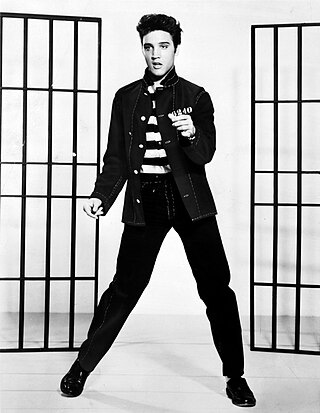
Elvis Aaron Presley, often referred to mononymously as Elvis, was an American singer and actor. Dubbed the "King of Rock and Roll", he is regarded as one of the most significant cultural figures of the 20th century. His energized interpretations of songs and sexually provocative performance style, combined with a singularly potent mix of influences across color lines during a transformative era in race relations, led him to both great success and initial controversy.
Rock and roll is a genre of popular music that evolved in the United States during the late 1940s and early 1950s. It originated from African-American music such as jazz, rhythm and blues, boogie woogie, gospel, jump blues, as well as country music. While rock and roll's formative elements can be heard in blues records from the 1920s and in country records of the 1930s, the genre did not acquire its name until 1954.
Rhythm and blues, frequently abbreviated as R&B or R'n'B, is a genre of popular music that originated in African-American communities in the 1940s. The term was originally used by record companies to describe recordings marketed predominantly to urban African Americans, at a time when "urbane, rocking, jazz based music ... [with a] heavy, insistent beat" was becoming more popular. In the commercial rhythm and blues music typical of the 1950s through the 1970s, the bands usually consisted of piano, one or two guitars, bass, drums, one or more saxophones, and sometimes background vocalists. R&B lyrical themes often encapsulate the African-American experience of pain and the quest for freedom and joy, as well as triumphs and failures in terms of relationships, economics, and aspirations.

David Byrne is a Scottish-American singer, songwriter, record producer, actor, writer, music theorist, visual artist and filmmaker. He was a founding member and the principal songwriter, lead singer, and guitarist of the American new wave band Talking Heads.
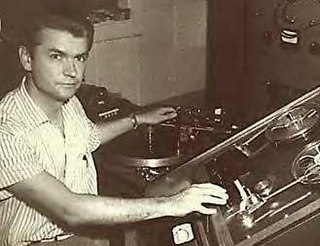
Samuel Cornelius Phillips was an American record producer. He was the founder of Sun Records and Sun Studio in Memphis, Tennessee, where he produced recordings by Elvis Presley, Roy Orbison, Jerry Lee Lewis, Carl Perkins, Johnny Cash, and Howlin' Wolf. Phillips played a major role in the development of rock and roll during the 1950s, launching the career of Presley. In 1969, he sold Sun to Shelby Singleton.
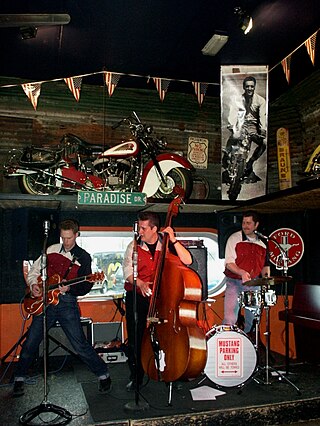
Rockabilly is one of the earliest styles of rock and roll music. It dates back to the early 1950s in the United States, especially the South. As a genre it blends the sound of Western musical styles such as country with that of rhythm and blues, leading to what is considered "classic" rock and roll. Some have also described it as a blend of bluegrass with rock and roll. The term "rockabilly" itself is a portmanteau of "rock" and "hillbilly", the latter a reference to the country music that contributed strongly to the style. Other important influences on rockabilly include western swing, boogie-woogie, jump blues, and electric blues.
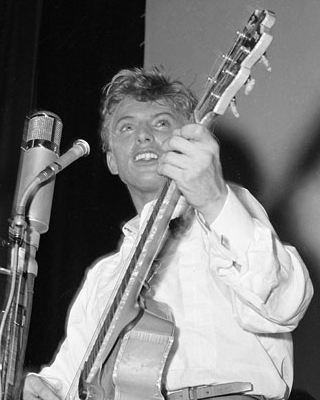
Sir Thomas Hicks, known professionally as Tommy Steele, is an English entertainer, regarded as Britain's first teen idol and rock and roll star.
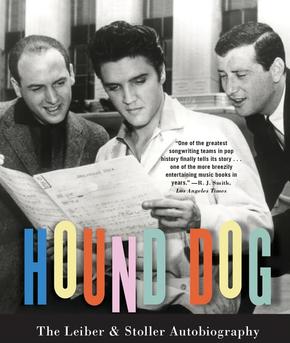
Lyricist Jerome Leiber and composer Michael Stoller were American songwriting and record producing partners. They found success as the writers of such crossover hit songs as "Hound Dog" (1952) and "Kansas City" (1952). Later in the 1950s, particularly through their work with the Coasters, they created a string of ground-breaking hits—including "Young Blood" (1957), "Searchin'" (1957), and "Yakety Yak" (1958)—that used the humorous vernacular of teenagers sung in a style that was openly theatrical rather than personal.
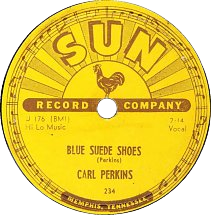
"Blue Suede Shoes" is a rock and roll standard written and first recorded by American singer, songwriter and guitarist Carl Perkins in 1955. It is considered one of the first rockabilly records, incorporating elements of blues, country and pop music of the time. Perkins' original version of the song appeared on the Cashbox Best Selling Singles list for 16 weeks and spent two weeks at the number two position.

Winston Conrad "Wink" Martindale is an American disc jockey, radio personality, game show host, and television producer. In his six-decade career, he is best known for hosting Gambit from 1972 to 1976, Tic-Tac-Dough from 1978 to 1985, High Rollers from 1987 to 1988, and Debt from 1996 to 1998.
Rock and roll is a genre of popular music that originated and evolved in the United States during the late 1940s and early 1950s.

"(Let Me Be Your) Teddy Bear" is a popular song first recorded by Elvis Presley in 1957 for the soundtrack of his second motion picture, Loving You, during which Presley performs the song on screen. It was written by Kal Mann and Bernie Lowe and published in 1957 by Gladys Music.

"Once in a Lifetime" is a song by the American new wave band Talking Heads, produced and cowritten by Brian Eno. It was released in November 1980 as the lead single from Talking Heads' fourth studio album, Remain in Light (1980), through Sire Records.

"Good Rocking Tonight" is a jump blues song originally released in 1947 by its writer, Roy Brown and was covered by many recording artists. The song includes the memorable refrain, "Well I heard the news, there's good rocking tonight!" The song anticipated elements of rock and roll music.

"At the Hop" is a 1950s pop song written by Artie Singer, John Medora, and David White and originally released by Danny & the Juniors. The song was released in the fall of 1957 and reached number one on the US charts on January 6, 1958, becoming one of the top-selling singles of 1958. "At the Hop" also hit number one on the R&B Best Sellers list. Somewhat more surprisingly, the record reached #3 on the Music Vendor country charts. It was also a big hit elsewhere, which included a number 3 placing on the UK charts.

Since the beginning of his career, American singer Elvis Presley has had an extensive cultural impact. According to Rolling Stone, "It was Elvis who made rock 'n' roll the international language of pop." The Rolling Stone Encyclopedia of Rock & Roll describes Presley as "an American music giant of the 20th century who single-handedly changed the course of music and culture in the mid-1950s". His recordings, dance moves, attitude and clothing came to be seen as embodiments of rock and roll. His music was heavily influenced by African-American blues, Christian gospel, and Southern country. In a list of the greatest English language singers, as compiled by Q magazine, Presley was ranked first, and second in the list of greatest singers of the 20th century by BBC Radio. Some people claim that Presley created a whole new style of music: "It wasn't black, wasn't white, wasn't pop or wasn't country—it was different." He gave teens music to grow up with and listen to, as most singers in his time created music geared for adults.

"I Got Stung" is a 1958 song recorded by Elvis Presley and released as a single written by Aaron Schroeder and David Hill and published by Elvis Presley's company Gladys Music, Inc. It was number one in the UK in 1959 and 2005 as a double A-side single.

Cliff is the 1959 debut album of British singer Cliff Richard and his band the Drifters. The recording is the first white professionally recorded live rock and roll album.
This article includes an overview of the major events and trends in popular music in the 1950s.
Pop music is a genre of popular music that originated in its modern form during the mid-1950s in the United States and the United Kingdom. The terms popular music and pop music are often used interchangeably, although the former describes all music that is popular and includes many disparate styles. During the 1950s and 1960s, pop music encompassed rock and roll and the youth-oriented styles it influenced. Rock and pop music remained roughly synonymous until the late 1960s, after which pop became associated with music that was more commercial, ephemeral, and accessible.
References
- ↑ Taubert, Klaus (13 December 2013). "Der Lipsi: Modetanz, made by SED". Spiegel Online (in German). Retrieved 5 August 2015.
- ↑ Wiener, Jon. How We Forgot the Cold War. University of California Press. p. 172. ISBN 9780520271418.
- ↑ Byrne, David (2009-09-17). Bicycle Diaries . ISBN 9780670021147.